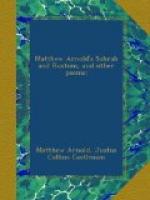=230. Not that one slight helpless girl, etc.= See ll. 609-611, also introduction to the poem.
=232. snow-haired Zal.= According to tradition, Zal was born with snow-white hair. His father Lahm, believing this an ill omen, doomed the unfortunate babe to be exposed on the loftiest summit of the Elburz Mountains. The Simurgh, a great bird or griffin, found him and cared for him till grown, then restored him to his repentant parent. He subsequently married the Princess Rudabeh of Seistan, by whom he became father of Rustum.
=243-248. He spoke ... men.= Note carefully Gudurz’s argument. Why so effective with Rustum?
=257. But I will fight unknown and in plain arms.= The shields and arms of the champions were emblazoned with mottoes and devices. Why does Rustum determine to lay aside his accustomed arms and fight incognito? What effect does this determination have upon the ultimate outcome of the situation? Read the story of the arming of Achilles (Book XIX., Homer’s Iliad), and compare with Rustum’s preparation for battle. [160]
=266. device.= See note, l. 257.
=277. Dight.= Adorned, dressed.
“The clouds in thousand
liveries dight.”
—MILTON. L’Allegro,
l. 62.
=286. Bahrein= or Aval. A group of islands in the Persian Gulf, celebrated for its pearl fisheries.
=288. tale.= Beckoning, number.
“And every shepherd
tells his tale,
Under the hawthorn in the dale.”
—MILTON. L’Allegro,
ll. 67-68.
=306. flowers.= Decorates, beautifies with floral designs.
=311. perused.= Studied, observed closely.
=318.= In a letter dated November, 1852, Mr. Arnold speaks of the figures in his poem as follows: “I can only say that I took a great deal of trouble to orientalize them, because I thought they looked strange, and jarred, if western.” What is gained by their use?
=325. vast.= Large, mighty.
=326. tried.= Proved, experienced.
=328. Never was that field lost or that foe saved.= Note the power gained in this line by the use of the alliteration.
=330. Be govern’d.= Be influenced, persuaded.
=343. by thy father’s head!= Such oaths are common to the extravagant speech of the oriental peoples.
=344. Art thou not Rustum?= See introductory note to poem.
=367. vaunt.= Boast implied in the challenge.
=380. Thou wilt not fright me so!= That is, by such talk.
=401. tower’d.= Remained stationary, poised.
=406. full struck.= Struck squarely.
[161]
=412. Hyphasis, Hydaspes.= Two of the rivers
of the Punjab in northern India, now known as the
Beas and Jhylum. In 326 B.C. Alexander defeated
Porus on the banks of the latter stream.




